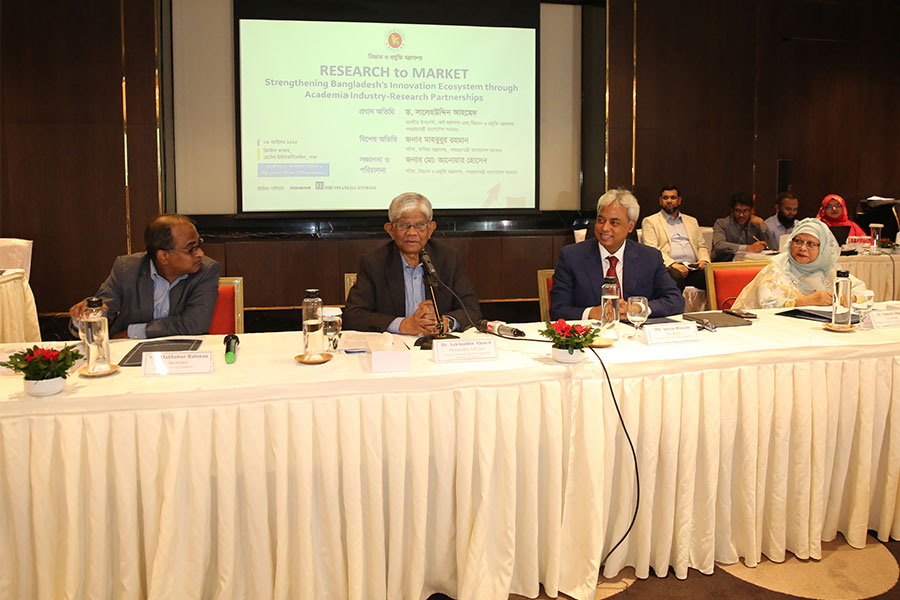Research, innovation must align with national development priorities: Dr Salehuddin

Published :
Updated :

Finance, Science and Technology Adviser Dr Salehuddin Ahmed has stressed the need to closely align research and innovation with the country’s national development priorities, saying that scientific progress and technological application will soon determine the foundation of economic competitiveness.
“We are heading toward an era where scientific advancement and the application of technology will be the key determinants of economic strength,” he said.
He made the remark while addressing as the chief guest at a roundtable discussion titled “Research to Market: Strengthening Bangladesh’s Innovation Ecosystem through Academia–Industry Research Partnerships,” held at a city hotel on Monday.
The discussion was organised by the Ministry of Science and Technology with support from the Bangladesh Council of Scientific and Industrial Research (BCSIR).
Dr Salehuddin emphasised the importance of building an effective bridge between laboratories and industries.
“Every taka invested by the government in research and development should contribute to productivity, job creation, and sustainable development,” he noted.
“The initiatives taken by the Ministry of Science and Technology to strengthen research–industry collaboration are timely, but both policy and financial support are essential to make them successful.”
Diaspora scientists willing to serve Bangladesh
A number of diaspora scientists are eager to serve the country in any way possible, as they seek an opportunity to contribute to their motherland’s development—not for financial gain but for honour, said Dr Salehuddin Ahmed.
He noted that although the government has several research organisations, many of them are not delivering impactful outcomes.
He observed that many local scientists of these organisations prefer going abroad mainly for publications rather than applying their knowledge for societal benefit.
“Such research often fails to reach the market due to a lack of industry feedback,” he said, adding, “We want to ensure that our research and development activities gain proper market access.”
Referring to his efforts to discourage unnecessary foreign trips by researchers, the adviser said, “I tried to prevent them from such tours, but it was not a successful move.”
Dr Salehuddin, however, acknowledged the contributions of local scientists in the fields of agriculture, fisheries, and livestock. “Many are working tirelessly, and as a result, we now have enough food for over 180 million people, whereas once we struggled to feed only 75 million,” he added.
The adviser also admitted that sometimes policymakers have failed to disseminate research findings at the field level, as most reports remain confined to their desks year after year.
To improve the situation, he urged stronger coordination among scientists, policymakers, and research institutions, calling on researchers to focus more on innovation and applied research.
Referring to the development trajectories of South Korea and Vietnam, the finance adviser said, “Once they were not in a better position than Bangladesh, but they made remarkable progress through their own research and development.”
The eminent economist urged local entrepreneurs to allocate funds for research and development in the greater interest of the people, even if such investments do not yield immediate personal returns.
He further said, “The government is keen to facilitate the private sector. Our goal is to make the country like Taiwan in industrial development, to be China is not our goal.”
Questioning the need for foreign medical treatment, Dr Salehuddin added, “Why should we go to Bangkok or Singapore for healthcare when we already have enough medical colleges and universities in our own country?”
Speaking as special guest, Commerce Secretary Mahbubur Rahman said, “The output of our research is not reaching the market. Even when someone makes an invention, it is not given due importance. We need to expand research opportunities at BCSIR and in various university laboratories.”
Science and Technology Secretary Md Anwar Hossain said the ministry is no longer confined to framing science-related policies; rather, it now acts as a catalyst for business competitiveness, export diversification, and innovation-driven growth. “Our goal is to transform research into economic strength and make innovation a part of daily life,” he added.
The secretary further said the ministry has recently undertaken several initiatives, including opening government laboratories and equipment for private researchers, launching joint research and fellowship programmes with the private sector, and planning to hold an ‘Innovation Fair’ in February 2026 to encourage local innovators.
“Through these initiatives, we aim to establish a global network with diaspora scientists and set up a dedicated cell for frontier industries to work on new technologies,” he added.
BCSIR Chairman Shamima Ahmed delivered the welcome address at the event.
The Financial Express and the daily Samakal were the media partners of the event.


 For all latest news, follow The Financial Express Google News channel.
For all latest news, follow The Financial Express Google News channel.